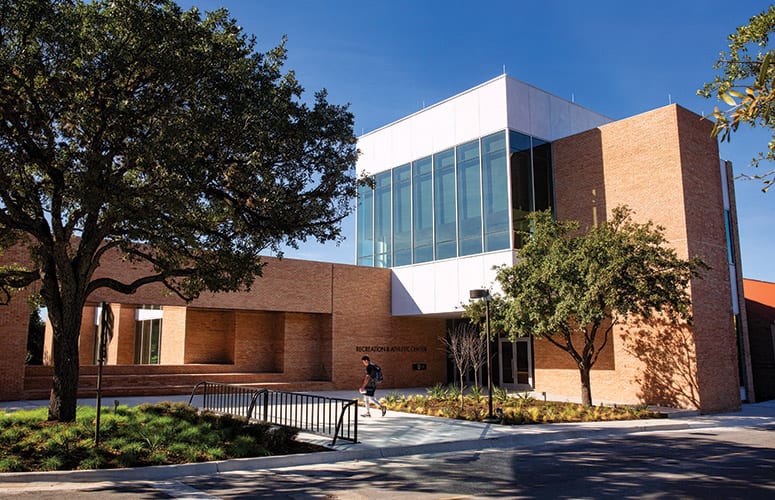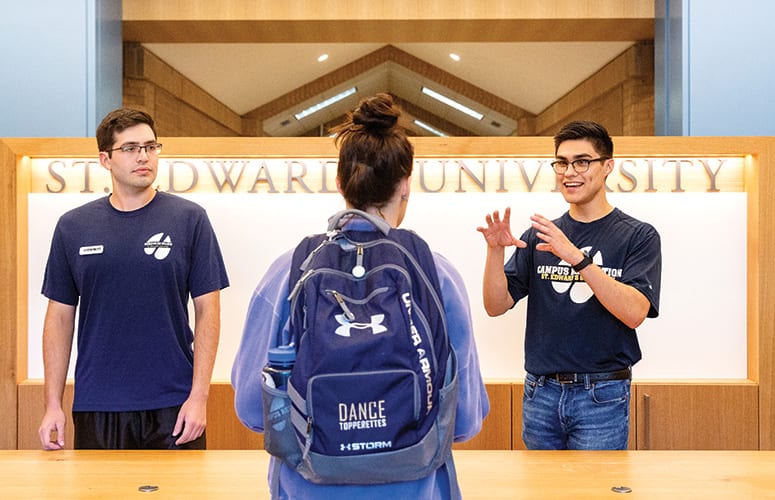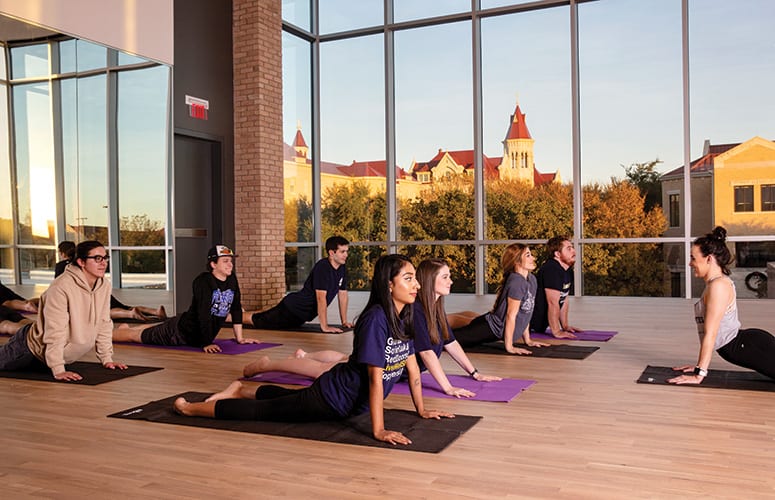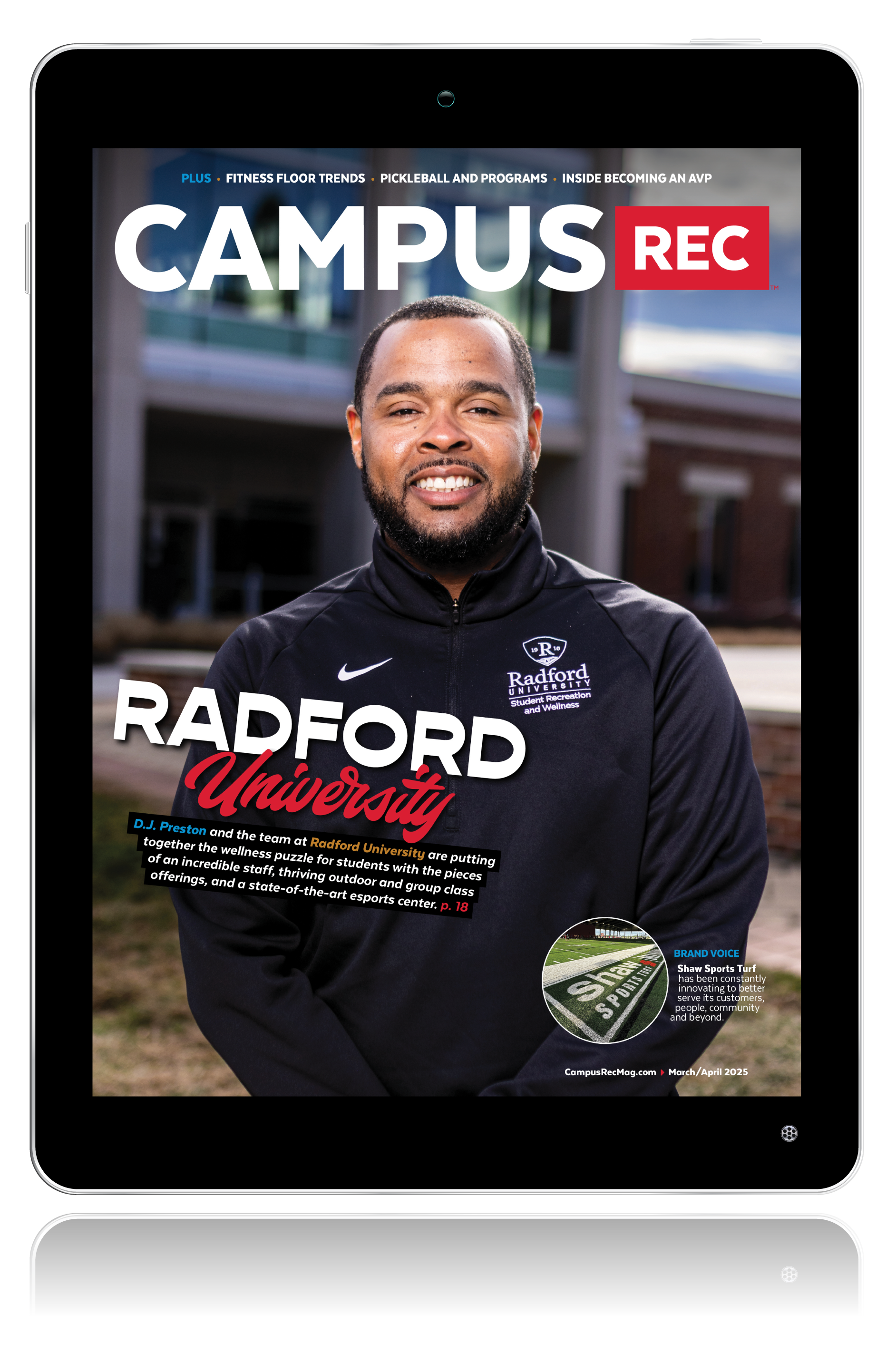The beginning of a year always means a fresh start. And for St. Edward’s University, this couldn’t be more tangible.
The Recreation and Athletic Center (RAC) expansion project was completed early January 2020. The project includes a 5,700-square-foot fitness center, multipurpose fitness studio and a well-being resource center; all of it was designed with a holistic approach to student well-being in mind. “With a tech-free wellness lounge, peer wellness coaching space and a wellness seminar room, we have created physical spaces that encourage a holistic approach to well-being,” explained Andy Lemons, the senior director of recreation and wellness (RecWell).
However, the project is just one part of two very big puzzle pieces that are debuting in 2020: Live Well SEU is St. Edward’s new wellness initiative, and launched right alongside the RAC’s expansion. “The Live Well SEU initiative amplifies the message we were trying to get out by expanding outside of our office and into the university community,” said Clint Jones, the associate director of recreation and wellness. “I think that is an awesome opportunity to create a healthier, more knowledgeable and socially responsible campus community right here in Austin, Texas.”
But this focus on well-being and wellness hasn’t just happened. Lemons and RecWell have been working over 10 years to gain today’s role at St. Edward’s. In fact, two years ago, RecWell was restructured to include wellness and outreach under the department’s umbrella. “This organization structure allows us to provide more in-depth knowledge around health topics to our traditional users, supporting our holistic well-being approach,” shared Lemons.
And that approach is more than apparent in the RAC expansion project. The tech-free wellness lounge is just one example. Born from a conversation between Lemons and the director of St. Edward’s IT department, it is 2,000 square feet with signage around the room saying no technology allowed. When students heard about the space, they were thrilled. Lemons said they are even trying to determine how to make this room Wifi free.

The co-working room is another example of the wellness initiative taking precedence in the project. Toted as a space dedicated to the student first, Lemons called it the “Swiss Army knife” of rooms in the RAC. It’s a small, multi-functional classroom with movable furniture. Adulting 101 workshops, film watching for varsity athletics, meditation and martial arts classes, etc. are all possible programming options. “As we’ve shown the impact of these types of programs on student success, as we’ve shared with decision-makers the research around how these types of experiences can help mental health with students, I think it’s changed the narrative that our administration looks at for supporting students,” shared Lemons.
That narrative is being told across campus. Krupa Shah, the assistant director of recreation and wellness, said with the launch of Live Well SEU, the department hopes to serve as a guiding resource for the rest of their campus partners. One example of how they are doing that is through the Don’t Cancel Class program. “The Don’t Cancel Class initiative encourages faculty to reach out to RecWell if they are unable to make it to their class,” said Shah. “Instead of cancelling class, the faculty member would fill out a RecWell program request form, which would allow them to choose from a list of well-being experiences they would like to invite into the classroom. Options include, but are not limited to, a meditation experience, yoga sessions, stress management/time management workshop, sleep health presentation or a Nutrition 101 workshop.”
Live Well SEU outlines eight dimensions that RecWell and the rest of the university’s departments work to meet. However, Lemons said something unique about the model is its “skills to thrive.” That means each department determines the expertise they have to meet one of the eight wellness dimensions. For example, financial services will focus on their role in students’ lives in terms of financial well-being. “It allows offices to determine those skills they want to develop in each area, but it requires tying back to student success,” shared Lemons.

Beyond the skills, Live Well SEU is also the lens through which the campus hosts creative events and programs. Tabbitha Ashford, the assistant director of recreation and wellness, said they are coming together as a campus to recognize students are here for their education. “It is critical we support their overall well-being in support of their academic achievement,” she said.
Well-being also means offering new programs outside your comfort zone. Jones has been supervising the St. Edward’s esports club team for the previous two years. He helped start the program, wading through the challenges of getting a location and funding, as well as finding and hiring a coach. The latter took filtering through a lot of great candidates, which Jones said are only increasing in number. “The key to finding a good coach is capitalizing on connections in the gaming community and finding the right fit for your university,” he said.
Despite the challenges, Jones said it’s been evident of the impact and importance of esports on the community, allowing opportunity for students who don’t do traditional sports. Plus, it’s been education for the campus community on how esports is more than your gamer stereotype. He explained teams practice their game about nine hours a week, adding a physical workout component for another nine to 10 hours. “I compare the program to a track team; you have your distance runners, shot put throwers, sprinters, long jumpers, etc.,” he said. “There are so many different games to play, but everyone is still on the same team practicing, watching their own and their opponents’ game tape, strategizing and improving their specific sport.”
So, whether it’s esports, a tech-free lounge or the Don’t Cancel Class program, RecWell is playing its role in Live Well SEU. As Ashford pointed out, the RAC is simply a culmination of the transition to a more well-being focus of the department and the campus as a whole.

However, with the 30,000-foot approach now happening, Lemons said he can’t forget from where they’ve come. In 2009, RecWell consisted of Lemons, four students and a budget of approximately $6,000. Now, there are four full-time staff, 80 student staff and a budget over half a million dollars. “It took us 10 years to finally build a culture of well-being on campus, but now that the ball is rolling, our campus sees us as a vital, integral part of student success in terms of recruitment, retention and graduation,” he shared. “We have fought the stigma that small isn’t as good.”
He encouraged any other schools to practice patience, realizing that a “no” now doesn’t mean it will always be a “no” in the future. It takes data, understanding your university administration, stepping outside your comfort zone, continuing to grow, and partnering with everyone on campus.
So, as 2020 begins, RecWell and Live Well SEU are launching St. Edward’s into a new future. As Shah shared, gone are the days where you step into a gym and all you see are treadmills and dumbbells. “Our new RecWell expansion is going to be a catalyst for the prioritization of holistic well-being on this campus,” said Shah. “We are so delighted to finally be able to provide this space for the students and employees of St. Edward’s.”
Photos by Chelsea Purgahn










